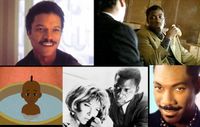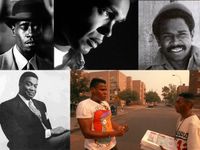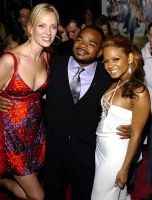
When rappers grip the true voice of the Black community, how effective is our political leadership?
Kanye West’s controversial impromptu comments a few weeks ago on a nationally televised relief telethon for the victims of Hurricane Katrina shocked the American public. Breaking from the pre-written script, he went into a discourse on how pleas for help from the Black citizens in New Orleans were being ignored by the federal government, capping it all off signifying that, “George Bush doesn’t care about Black people.” How shocking it is to hear this new information about Dubya. I do support Kanye’s comments, but this isn’t about that.
The nationwide spirit of the Black community is begging for a change, one that I think given the opportunity a large segment of us would be willing to fight for. Well before this time of crisis in the Gulf region of the US, Black denizens of New Orleans have been grossly disenfranchised. Jobs were hard to come by and living conditions were deplorable, echoing many other Black communities across the nation. For an entertainer like Kanye West to recognize this, and then have the gumption to speak on it on nationwide television is a horrid reflection on our national Black leadership. I’m not being critical of grass roots leaders or organizations that fight and sacrifice themselves on a daily to help disadvantaged folks, but mainly of the majority of our elected officials who we voted into office to be our voice but instead just have their own personal interests at heart. The Congress-people, State Senators, and the like who should be making glaringly obvious declarations on our behalf, or at least fighting behind the scenes to make sure things like this cannot happen, instead spend their days thinking about the next chicken dinner banquet they should attend.
For many Black youth, in America and the rest of the world, our musicians and artists hold the true voice of our community. Whether it’s Chuck D of Public Enemy who takes the chance to speak to bold truths here in America, or it’s the late great Fela Kuti of Nigeria who spoke out against his government’s shady tactics, it’s too often that they are the ones sacrificing their livelihoods instead of attitudes.
“Rap fans love a progressive voice that bucks the system. That spirit of rebellion gave birth to hip-hop in the first place and remains a vital part of the culture,” says Curtis Stephen, a columnist for New York Newsday. He continues, “With unemployment, AIDS, gang violence and a host of other social ills soaring in the Black community, it's not surprising that large segments of the black community feel disillusioned with the political process and the general state of affairs. When they look around, they're not likely to hear elected officials addressing the issues that impact their daily lives…But those same issues are likely to be addressed on some of the rap albums they purchase -- and that's why Chuck D called rap "the black CNN" years ago.”
It is argued that more artists, especially millionaire rappers who claim they’re hardcore and from the streets, should do more for their communities instead of frivolously spending their money on Belvedere and Benz’s. Additionally, many of them do have grossly negative attitudes toward women which too many of us in the Black community support, and repeat. However, these artists campaigned for us to spend our money on their CD’s and movies, not to represent our cultural and economic differences in the seat of government.
Our respective Black communities across the nation need to take a stand. We need to write into our elected officials and demand that they either regard, or research, the issues that are most critical to us all and then find ways to combat those issues in order to make our communities stronger, and possibly even more self-sufficient. Our communities can then actually be even more united because we would be fighting for common goals. Conspiracies being what they are, I’m sure what I’m recommending is exactly what “the machine” is fighting against. But “the machine” is just that, a piece of equipment that can be broken down.
I’m not interested in how things used to be. Urging our Black elected officials to invoke the spirits of Shirley Chisholm and Adam Clayton Powell may ring deaf in their distracted ears.
But whether its polar opposites like Ras Baraka or Hillary Clinton, they need to be reminded on a constant just who got them into office, and who can get them out; it really is that simple.














